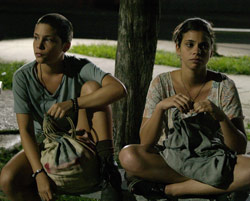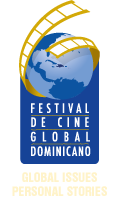

In addition to being organized by non-profit organizations, the Dominican Republic Global Film Festival is distinguished for its role in promoting the DR as an excellent location to make and produce films, thus contributing to the Country's economic growth and competitiveness.
Mission
The Dominican Global Film Festival presents a selection of the best international, dramatic and documentary films to enrich the country’s film culture and to bring the seventh art into all sectors of Dominican society. The Festival contributes to raising awareness and understanding of global issues through stories about events and people that have left a mark on our lives. It uses film as a way to promote and encourage discussion about social issues, politics and economics.
Goals
To enrich the film culture of the Dominican Republic.
To show a wide variety of films that are generally not available to the Dominican public.
more information

7 Locations
14 Venues
Santo Domingo: Funglode, Teatro Nacional, Auditorio Pedro Mir (UASD), Palacio del Cine Blue Mall, Centro Cultural Mauricio Baéz and the Centro Cultural de las Telecomunicaciones
Santiago (CURSA and Palácio del Cine)
Puerto Plata (CURA)
Nagua (CURNA)
Higüey (CURE)
Capcana
Haití (Puerto Príncipe)
more information

America (2010) Puerto Rico
view all films
Americano (2011) Francia
Asalto al cine (2011) Mexico
Balada triste de trompeta (2010) España
Boleto al paraiso (2010) Cuba
Bicicleta, cuchara, manzana (2010) España
Binta y la gran idea (2005) España
Cápsulas (2011) Guatemala
Carlos (2010) Francia
Carro publico (2008) Enfoque Africa
Catching Hell (2011) Estados Unidos
Chico y Rita (2010) España
Como estrellas en la tierra (2007) India
Cuando el tambor esta latiendo (2011) Haiti
Detective Dee y el misterio de la llama fantasma (2010) China
Dev-D (2009) India
El Sotano (2011) República Dominicana
El dedo (2011) Argentina
El viaje silencioso (2007) Estados Unidos
G.W.B. (2011) Estados Unidos
Estados Unidos (2011) Estados Unidos
Jaque Mate (2011) República Dominicana
Jean Gentil (2010) República Dominicana
Hombres al dente (20101) Italia
Las llaves de la independencia (2005) España



November 20
Closing Night with Fernando Trueba (Chico and Rita) at Teatro NacionalNovember 19
Tower Heist Film, Screening in Cap Cana
Panel: Actors Studio (by: Steven Bauer) at MAURICIO BAEZNovember 18
11 Finalists of 3rd Short Film Competition WinnersNovember 17
Tribute at National PalaceNovember 16
view photo galleries
Opening Night with the Blue Carpet - TEATRO NACIONAL
Welcome Cocktail - FUNGLODE
Gathering for Special Guests - Hotel Embajador

Chico and Rita
IGM Shorts Contest (WINNING)
6:00 PM Teatro NacionalGun Hill Road
6:00 PM Centro Cultural Mauricio BaezAll your dead ones
5:00 PM UASD, Auditorium Manuel del CabralDetective Dee and the Mystery of the Phantom Flame
6:00 PM Centro Cultural de las TelecomunicacionesCatching Hell
view full program
5:00 PM
CURE - HIGUEY

The Dominican Republic Global Film Festival is proud to honor and dedicate this year´s 5th edition of the Festival to María Montez, the first Dominican actress to achieve fame in Hollywood as she became a reference for filmmaking worldwide. Next year, 2012, is the 100 year anniversary of the birth of María Montez, “the Queen of Technicolor.” For that reason, the Dominican Global Film Festival has honor to of placing her name first on this year´s list of Tributes.
We are equally proud to welcome other national and international film and entertainment greats to this Festival. Welcome Geraldine Chaplin, Danny Glover, Vin Diesel, Agliberto Meléndez, Moctesuma Esparza and Rafael Solano.
Festival Dedication to María Montez
Continental Focus: Africa
more information
Guest of Honor: India
Lifetime Achievement Award: Geraldine Chaplin
"Arturo Rodríguez" Hispanic Pride in the Seventh Art Award": Moctesuma Esparza
"Camilo Carrau" National Film Pride Award: Agliberto Meléndez
Humanitarian Award: Danny Glover
Musical Contributions in the Audiovisual Arts: Rafael Solano
Support for National Cinema Award: Vin Diesel
People’s Choice Award for the Best Picture 2010: “Jean Gentil”
People’s Choice Honorable Mention for Best Picture 2010: “La Hija Natural”

There will be two types of Prizes during the Festival:
1. Awards for the 3rd Short Films Competitions to be awarded by a special jury.
The prizes include the following: An iMac, The opportunity to make a short film under the auspices of the Dominican film production company, Panamericana, Scholarships to study at the Film School at the University of California Los Angeles (UCLA) and the Film and Television School of San Antonio de los Baños, Cuba (EICTV), Free online courses for one year offered by www.video2brain.com2. Audience Awards (for best dramatic film and best documentary film), to be selected by ballot after each screening.
view the winners

FRIDAY NOVEMBER 18
Laws Relative to the Film Industry
Dominican Film Law and its benefits
Entertainment Industry
“I’m in L.A. Now What?”
Rubirosa: The Last PlayboySATURDAY NOVEMBER 19
Journey of a Comedian
Journalists and Reporters in the Film Industry
Actor Studio
Acting workshop
Business of FilmSUNDAY NOVEMBER 20
Real Steel and its special effects
more information

 Santo Domingo, November 20, 2011
Santo Domingo, November 20, 2011
Film Nights at the National Theater
 Santo Domingo, November 20, 2011
Santo Domingo, November 20, 2011
“GWB” Plays to a Full House in Santo Domingo
view all news Santo Domingo, November 19, 2011
Santo Domingo, November 19, 2011
Advice from Hollywood Stars to Aspiring Dominican Actors: Work Hard with Passion

These are the 11 finalists of our 3rd Short Film Competition.
Congratulations to everyone!
1. Bajo la Mesa
more information
2. Bienvenida a Casa
3. Cara // Escudo
4. Casimente
5. El Dinero
6. !Hola Mamá! (Third Place)
7. Iguales (Second Place)
8. Irresponsabilidad Cívica
9. La Mujer (First Place)
10. Promesa de Lechón
11. Regresión
Chijona’s film is based on a true story when, between 1992-1993, a group of 60 teenagers infected themselves with the HIV virus in order to be admitted to the Santiago de las Vegas Hospital


“Ticket to Paradise” - Interview with director, Gerardo Chijona
The Cuban film “Boleto al Paraíso” (2011), is Gerardo Chijona’s first drama after three comedies, and a drama it is…based on a shocking true story of a group of teens who infected themselves with the HIV virus to get into a hospital where their lives would be easier than they were living on the streets.
The film showed this week at the UASD as part of the Dominican Republic Global Film Festival (DRGFF). In 1993 Cuba, as a severe economic crisis rages, Eunice runs away from her small town and her sexually aggressive father. With nowhere to go, she joins up with a group of homeless teens hitchhiking to Havana. Eunice feels an instant connection to charismatic ringleader Alejandro. But her damaged past and his preoccupation with his dead-end existence stand in the way. Desperate, with no opportunities to improve their lives, the two consider taking extreme measures to reach an unlikelyparadise an AIDS hospice.
 Based on a true story
Based on a true story
Chijona’s film is based on a true story when, between 1992-1993, a group of 60 teenagers infected themselves with the HIV virus in order to be admitted to the Santiago de las Vegas Hospital where they would be well cared for. They were operating under the mistaken premise that within a couple of years there would be a cure for AIDS.
“When we decided to make the film in this style, we knew we were dealing with real life stories and we wanted the film to have the docu-drama character,” said Cuban director, Gerardo Chijona, who also works at the Cuban Institute of Art and Film Industry (ICAIC in Spanish) with whom the DRGFF recently signed a collaboration agreement.
Why drama and why now?
“The idea to make this film walked through my door one night under the arm of my old friend, Dr. Jorge Pérez [former director of the Santiago de las Vegas AIDS Hospital]. He was carrying the manuscript to a book he just finished called ‘AIDS: Confessions of a Doctor.’ We’ve been friends for years and he asked me to read his manuscript and make comments and suggestions. I read the whole manuscript that very night and immediately knew it was going to be my next movie. The problem was figuring out how to tell the 20 or more stories in the book. They were all moving, passionate, gut-wrenching and some so strong as to be almost sinister. But, of course, no book is automatically ready for the screen. There is a process of elaboration that involves writing a treatment then a script,” explained Chijona who added that throughout the entire process he relied on the permanent advice and counsel from his friend, Dr. Pérez.
Eventually, Chijona decided to combine the stories from the book into one story. He said the stories were “an explosive mixture of innocent, inexperience and ignorance of teens from violent or dysfunctional families.”
Chijona explained that of those 60 teenagers who went into the Santiago de las Vegas Hospital, 30 are dead and the rest left the hospital to live with family when it was closed in 1994. Today, in Cuba, there are some 11,000 cases of HIV-AIDS.
The film looks at the beginning of the HIV virus in Cuba although it is more than that. It is about exclusion, isolation and love.
“I wanted to transmit to the Cuban people a reflection of why what happened came to pass and that no one opened the door to these young people,” said Chijona.
He added that he feels the film, and himself, have been well received at this 5th edition of the Dominican Republic Global Film Festival.


